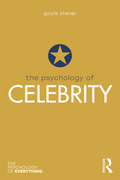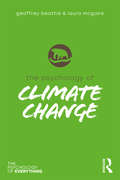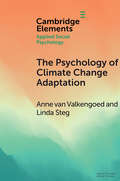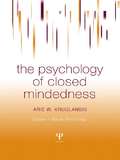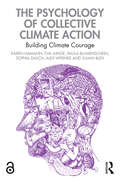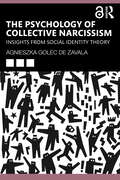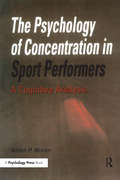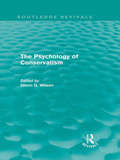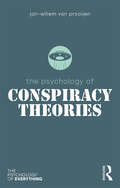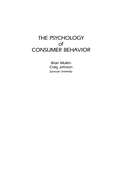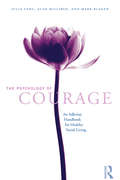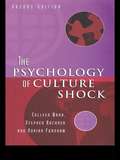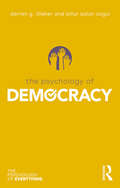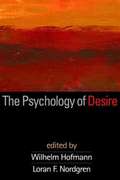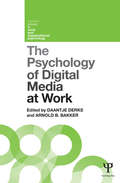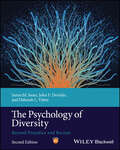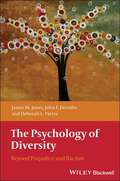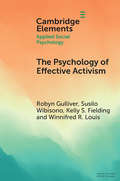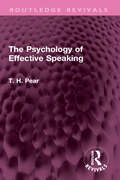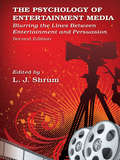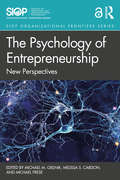- Table View
- List View
The Psychology of Celebrity (The Psychology of Everything)
by Gayle SteverWhy are we fascinated by celebrities we’ve never met? What is the difference between fame and celebrity? How has social media enabled a new wave of celebrities? The Psychology of Celebrity explores the origins of celebrity culture, the relationships celebrities have with their fans, how fame can affect celebrities, and what shapes our thinking about celebrities we admire. The book also addresses the way in which the media has been and continues to be an outlet for celebrities, culminating in the role of social media, reality television, and technology in our modern society. Drawing on research featuring real life celebrities from the Kardashians to Michael Jackson, The Psychology of Celebrity shows us that celebrity influence can have both positive and negative outcomes and the impact these can have on our lives.
The Psychology of Climate Change (The Psychology of Everything)
by Geoffrey Beattie Laura McGuireWhat explains our attitudes towards the environment? Why do so many climate change initiatives fail? How can we do more to prevent humans damaging the environment? The Psychology of Climate Change explores the evidence for our changing environment, and suggests that there are significant cognitive biases in how we think about, and act on climate change. The authors examine how organisations have attempted to mobilise the public in the fight against climate change, but these initiatives have often failed due to the public’s unwillingness to adapt their behaviour. The book also explores why some people deny climate change altogether, and the influence that these climate change deniers can have on global action to mitigate further damage. By analysing our attitudes to the environment, The Psychology of Climate Change argues that we must think differently about climate change to protect our planet, as a matter of great urgency.
The Psychology of Climate Change Adaptation (Elements in Applied Social Psychology)
by Linda Steg Anne van ValkengoedWhy do some people adapt to the risks of climate change, while others do not? This Element provides an in-depth overview of the psychology of climate change adaptation. It begins with an overview of adaptation behaviour and highlights the importance of successful adaptation by individuals and households. Key psychological theories are introduced that can explain adaptation behaviour and the role of a wide variety of motivational variables in adaptation behaviour is discussed, such as risk perception, experiences with climate-related hazards, and perceived responsibility. Next, the authors examine three examples of how this psychological knowledge has been used to develop and test interventions to promote adaptation behaviour in real-world settings. After which, the relationship between climate adaptation behaviour and climate mitigation behaviour are considered and the potential for integrating these bodies of literature is put forward. It concludes with an agenda for future psychological research on climate change adaptation behaviour.
The Psychology of Closed Mindedness (Essays in Social Psychology)
by Arie W. KruglanskiThe fundamental phenomenon of human closed-mindedness is treated in this volume. Prior psychological treatments of closed-mindedness have typically approached it from a psychodynamic perspective and have viewed it in terms of individual pathology. By contrast, the present approach stresses the epistemic functionality of closed-mindedness and its essential role in judgement and decision-making. Far from being restricted to a select group of individuals suffering from an improper socialization, closed-mindedness is something we all experience on a daily basis. Such mundane situational conditions as time pressure, noise, fatigue, or alcoholic intoxication, for example, are all known to increase the difficulty of information processing, and may contribute to one's experienced need for nonspecific closure. Whether constituting a dimension of stable individual differences, or being engendered situationally - the need for closure, once aroused, is shown to produce the very same consequences. These fundamentally include the tendency to 'seize' on early, closure-affording 'evidence', and to 'freeze' upon it thus becoming impervious to subsequent, potentially important, information. Though such consequences form a part of the individual's personal experience, they have significant implications for interpersonal, group and inter-group phenomena as well. The present volume describes these in detail and grounds them in numerous research findings of theoretical and 'real world' relevance to a wide range of topics including stereotyping, empathy, communication, in-group favouritism and political conservatism. Throughout, a distinction is maintained between the need for a nonspecific closure (i.e., any closure as long as it is firm and definite) and needs for specific closures (i.e., for judgments whose particular contents are desired by an individual).Theory and research discussed in this book should be of interest to upper level undergraduates, graduate students and faculty in social, cognitive, and personality psychology as well as in sociology, political science and business administration.
The Psychology of Collective Climate Action: Building Climate Courage
by Karen Hamann Eva Junge Paula Blumenschein Sophia Dasch Alex Wernke Julian BlehHow do we find the courage to act together against the climate crisis? This book weaves together real-life findings and examples from the socio-ecological movement with psychological research to show how motivation for collective climate action can be built.The book addresses two key questions: how can individuals be motivated to participate in collective climate action, and how can climate groups become resilient and effective? Specifically, it explores how individuals can foster their identification with climate action groups and the belief in their joint efficacy. It touches on a wide range of topics, covering anger, moral considerations, activist burnout, and the perception of protests, as well as general theories of socio-ecological change.This book is for anyone who is seeking the courage to act together and is curious about psychological insights. It will be essential reading for climate and environmental practitioners, climate activists and campaigners, climate change communicators, and anyone involved in socio-ecological change. It will also be of interest to students and researchers in the fields of environmental psychology, climate change, collective action, and political psychology.The Open Access version of this book, available at http://www.taylorfrancis.com, has been made available under a Creative Commons (CC BY) 4.0 license.
The Psychology of Collective Narcissism: Insights from Social Identity Theory
by Agnieszka Golec De ZavalaThe Psychology of Collective Narcissism is a ground-breaking text that presents a new theory of collective narcissism, a belief that exaggerated greatness of one’s own group should be but is not sufficiently appreciated by others. The book presents this concept against the background of social identity theory and research. It explores antecedent as well as social and political consequences of collective narcissism. The author discusses how this burgeoning theory and research can help to elucidate a wide range of psychological dynamics involved in pressing societal issues, such as the declining appeal of democracy, increasing populism, decreasing social solidarity, increasing societal polarization and prejudice, intergroup hostility and political violence, social inequality, and fake news and belief in conspiracy theories. Also referring to societal problems exacerbated by the COVID-19 pandemic, this highly topical work explores socially shared beliefs as risk factors when predicting responses to crises and highlights conditions in which collective narcissism can be expected. The author also reviews research on interventions reducing the link between collective narcissism, prejudice, and retaliatory intergroup hostility focusing on her recent research on mindfulness. This is a valuable read for academics and students in psychology and the social sciences, those interested in societal processes as well as professionals dealing with the impact of collective narcissism. The Open Access version of this book, available at http://www.taylorfrancis.com, has been made available under a Creative Commons Attribution-Non Commercial-No Derivatives (CC-BY-NC-ND) 4.0 license.
The Psychology of Concentration in Sport Performers: A Cognitive Analysis
by Aidan P. MoranFirst published in 1996. Routledge is an imprint of Taylor & Francis, an informa company.
The Psychology of Conflict and Conflict Management in Organizations (Siop Organizational Frontiers Ser.)
by Michele J. Gelfand Carsten K. W. De DreuThis volume in SIOP's Organizational Frontiers Series is a state-of-the-art overview of contemporary conflict research which aims to place conflict research and theory squarely within the realm of industrial and organizational psychology. This volume brings together and integrates classic and contemporary insight in conflict origins, conflict
The Psychology of Conservatism (Routledge Revivals)
by Glenn WilsonFirst published in 1973, The Psychology of Conservatism explores attitudes, their measurement, their structure and dynamics, and the personality traits apparently underlying attitude patterns. It examines the link between differing attitudes and discusses characteristic patterns and syndromes. The book focuses on the origins and dynamics of a major factor called "liberalism – conservatism" which is found to account for much of the variance in attitudes amongst different people. Contributors review previous studies relating to personality and attitude before engaging in new studies and proposing their own theories to explain the conservative attitude. The book introduces provocative theoretical ideas and provides a valuable examination of an important psychological and social attitude syndrome. This book will be of interest to researchers in personality and social psychology, sociology and political science and education.
The Psychology of Conspiracy
by Aleksandra Cichocka Michal Bilewicz Wiktor SoralWhy did the third World Trade Center building (WTC7) collapse on September 11th , even though it was not struck by any aircraft? Why did Princess Diana’s "drunk" driver look sober as he climbed into the car minutes before their deadly accident? Could a slender birch tree really have caused the plane crash which killed the President of Poland in 2010? ‘Conspiracy thinking’ – the search for explanations of significant global events in clandestine plots, suppressed knowledge and the secret actions of elite groups – provides simple and logical answers to the social doubts and uncertainties that occur at times of major national and international crises. Contemporary social psychology seeks to explain the human motivation to create, share and receive conspiracy theories, and to shed light on the consequences of these theories for people’s social and political functioning. This important collection, written by leading researchers in the field, is the first to apply quantitative empirical findings to the subject of conspiracy theorizing. The first section of the book explores conspiracy theories in the context of group perception and intergroup relations, paying particular attention to anti-Semitic conspiracy stereotypes. It then goes on to examine the relationship between an individual’s political ideology and the degree to which they engage in ‘conspiracy thinking’. The concluding part of the book considers the explanatory power of conspiracy, focusing on the link between social paranoia and digital media, and highlighting the social, political, and environmental consequences of conspiracy theories. The Psychology of Conspiracy will be of great interest to academics and researchers in social and political psychology, and a valuable resource to those in the fields of social policy, anthropology, political science, and cultural studies.
The Psychology of Conspiracy Theories (The Psychology of Everything)
by Jan-Willem van ProoijenWho believes in conspiracy theories, and why are some people more susceptible to them than others? What are the consequences of such beliefs? Has a conspiracy theory ever turned out to be true? The Psychology of Conspiracy Theories debunks the myth that conspiracy theories are a modern phenomenon, exploring their broad social contexts, from politics to the workplace. The book explains why some people are more susceptible to these beliefs than others and how they are produced by recognizable and predictable psychological processes. Featuring examples such as the 9/11 terrorist attacks and climate change, The Psychology of Conspiracy Theories shows us that while such beliefs are not always irrational and are not a pathological trait, they can be harmful to individuals and society.
The Psychology of Consumer Behavior
by Craig Johnson Brian MullenAfter years of study in the area of consumer behavior, Mullen and Johnson bring together a broad survey of small answers to a big question: "Why do consumers do what they do?" This book provides an expansive, accessible presentation of current psychological theory and research as it illuminates fundamental issues regarding the psychology of consumer behavior. The authors hypothesize that an improved understanding of consumer behavior could be employed to more successfully influence consumers' use of products, goods, and services. At the same time, an improved understanding of consumer behavior might be used to serve as an advocate for consumers in their interactions in the marketplace.
The Psychology of Counterfactual Thinking (Routledge Research International Series in Social Psychology)
by David R. Mandel Denis J. Hilton Patrizia CatellaniThis book provides a critical overview of significant developments in research and theory on counterfactual thinking that have emerged in recent years and spotlights exciting new directions for future research in this area. Key issues considered include the relations between counterfactual and casual reasoning, the functional bases of counterfactual thinking, the role of counterfactual thinking in the experience of emotion and the importance of counterfactual thinking in the context of crime and justice.
The Psychology of Courage: An Adlerian Handbook for Healthy Social Living
by Julia Yang Alan MillirenCourage refers to the willingness for risk taking and to move ahead in the presence of difficulties. The purpose of this book is to present courage as the main foundation of understanding and training for mental health in the three life task areas described by Adler: Work, Love, and Friendship. It explores the meaning of each life task and problems of fear, compensation, or evasion, as well as Adlerian insight on socially useful attitudes of approaching the task under discussion. Socratic dialog boxes are included throughout each chapter to encourage the interactivity between the text and readers’ thought processes. Also included is a set of twenty-two helping tools that were creatively designed for self-exercise or to be used to help others uncover or acquire courage. For those in the helping professions, this text will be a unique and valuable handbook for not only working with and helping their clients, but also for their own personal development.
The Psychology of Culture Shock
by Stephen Bochner Adrian Furnham Colleen WardCrossing cultures can be a stimulating and rewarding adventure. It can also be a stressful and bewildering experience. This thoroughly revised and updated edition of Furnham and Bochner's classic Culture Shock (1986) examines the psychological and social processes involved in intercultural contact, including learning new culture specific skills, managing stress and coping with an unfamiliar environment, changing cultural identities and enhancing intergroup relations.The book describes the ABCs of intercultural encounters, highlighting Effective, Behavioural and Cognitive components of cross-cultural experience. It incorporates both theoretical and applied perspectives on culture shock and a comprehensive review of empirical research on a variety of cross-cultural travellers, such as tourists, students, business travellers, immigrants and refugees. Minimising the adverse effects of culture shock, facilitating positive msychological outcomes and discussion of selection and training techniques for living and working abroad represent some of the practical issues covered.The Psychology of Culture Shock will provide an essential reference and textbook for courses within psychology, sociology and business training. It will also be a valuable resource for professionals working with culturally diverse populations and acculturating groups such as international students immigrants or refugees.
The Psychology of Democracy (The Psychology of Everything)
by Darren G. Lilleker Billur Aslan OzgulWhat is a democracy? Why do we form democratic systems? Can democracy survive in an age of distrust and polarisation? The Psychology of Democracy explains the psychological underpinnings behind why people engage with and participate in politics. Covering the influence that political campaigns and media play, the book analyses topical and real-world political events including the Arab Spring, Brexit, Black Lives Matter, the US 2020 elections and the Covidd-19 pandemic. Lilleker and Ozgul take the reader on a journey to explore the cognitive processes at play when engaging with a political news item all the way through to taking to the streets to protest government policy and action. In an age of post-truth and populism, The Psychology of Democracy shows us how a strong and healthy democracy depends upon the feelings and emotions of its citizens, including trust, belonging, empowerment and representation, as much as on electoral processes.
The Psychology of Desire
by Loran F. Nordgren Wilhelm HofmannProviding a comprehensive perspective on human desire, this volume brings together leading experts from multiple psychological subdisciplines. It addresses such key questions as how desires of different kinds emerge, how they influence judgment and decision making, and how problematic desires can be effectively controlled. Current research is reviewed on underlying brain mechanisms and regulatory processes. Cutting-edge measurement tools are described, including practical recommendations for their use. The book also examines pathological forms of desire and the complex relationship between desire and happiness. The concluding section analyzes specific applied domains--eating, sex, aggression, substance use, shopping, and social media.
The Psychology of Digital Media at Work
by Arnold B. Bakker Daantje DerksIn many professions daily work life has become unthinkable without the use of a computer with access to the Internet. As technological innovations progress rapidly and new applications of interactional media are invented, organizational behaviour continues to change. The central theme of this book is how new media affect organizational behavior and employee well-being. A variety of topics are considered: applications of new media in both personnel psychology and organizational psychology tools to improve selection and assessment issues arising in the context of training, learning and career development the use of online games for education and recreation the impact of mobile devices on organizational life the implications of new forms of collaboration by means of virtual teams. The research documented in this volume consists of high quality, quantitative studies illustrated by lively practical examples. The combination of science and practice ensures that new insights supported by empirical studies are translated into practical implications. The book will be essential reading for researchers and students in organizational psychology and related disciplines.
The Psychology of Diversity: Beyond Prejudice and Racism
by James M. Jones Deborah L. Vietze John F. DovidioExamines the barriers and benefits of diversity, offering a comprehensive framework for addressing systemic inequities and enhancing intergroup relations The Psychology of Diversity: Beyond Prejudice and Racism provides a thorough exploration of how diversity influences individual and societal behavior. Now in its second edition, this fully revised textbook addresses the evolving challenges and opportunities of diversity in a world shaped by rapid demographic shifts, rising polarization, and the intensifying need for equity and inclusion. Integrating rigorous research, historical context, and actionable insights, the authors illuminate how understanding and embracing diversity can foster stronger communities and institutions. Updated and expanded content responds to the evolving challenges of the past decade, such as rising political polarization, increasing resistance to equity initiatives, and the escalating diversity divide, while highlighting new opportunities for inclusion and mutual understanding. Entirely new chapters address health disparities, racial bias in policing, debates over affirmative action and Critical Race Theory, the historical and systemic roots of diversity challenges, and other contemporary issues. Featuring timely coverage of diversity's complexities in the face of unprecedented societal changes, Psychology of Diversity: Beyond Prejudice and Racism: Explores diversity through psychological, historical, cultural, and institutional lenses while highlighting its broader societal impacts Provides evidence-based strategies and best practices for fostering inclusion, reducing bias, and building stronger intergroup relations Incorporates empirical research and case studies reflecting the latest findings in psychology, sociology, and neuroscience Contains new content on gender diversity, nonbinary identities, sexual orientation, and immigration as key diversity challenges and opportunities Integrates practical scenarios to illustrate key concepts and their application in everyday life Includes a wealth of teaching and learning tools and an online instructor's manual to support both independent study and classroom use The Psychology of Diversity: Beyond Prejudice and Racism, Second Edition, is an excellent textbook for advanced undergraduate and graduate courses on social psychology, prejudice, intergroup relations, and multiculturalism. It is also a valuable reference for professionals working to address equity challenges in fields such as education, healthcare, public policy, and organizational leadership.
The Psychology of Diversity: Beyond Prejudice and Racism (Coursesmart Ser.)
by James M. Jones Deborah L. Vietze John F. DovidioThe Psychology of Diversity presents a captivating social-psychological study of diversity, the obstacles confronting it, and the benefits it provides. Goes beyond prejudice and discrimination to discuss the personal and social implications of diversity for both majority and minority group members Considers how historical, political, economic, and societal factors shape the way people think about and respond to diversity Explains why discrimination leads to bias at all levels in society – interpersonal, institutional, cultural, and social Describes proven techniques for improving intergroup relations Examines the brain's impact on bias in clear terms for students with little or no background in neuroscience Includes helpful study tools throughout the text as well as an online instructor’s manual
The Psychology of Effective Activism (Elements in Applied Social Psychology)
by Robyn Gulliver Susilo Wibisono Kelly S. Fielding Winnifred R. LouisThis Element reviews the social psychology of effective collective action, highlighting the importance of considering activists' goals, timeframes, and psychological perspectives in seeking to conceptualise this construct. A novel framework 'ABIASCA' maps effectiveness in relation to activists' goals for mobilisation and change (Awareness raising; Building sympathy; turning sympathy into Intentions; turning intentions into Actions; Sustaining groups over time; Coalition-building; and Avoiding opponents' counter-mobilisation). We also review the DIME model of Disidentification, Innovation, Moralization and Energization, which examines the effects of failure in creating trajectories of activists' disidentification from collective action; innovation (including to radicalisation or deradicalisation); and increased moral conviction and energy. The social psychological drivers of effective collective action for four audiences are examined in detail, in four sections: for the self and supporters, bystanders, opponents, and for third parties. We conclude by highlighting an agenda for future research, and drawing out key messages for scholars.
The Psychology of Effective Speaking (Routledge Revivals)
by T. H. PearFirst published in 1933, The Psychology of Effective Speaking studies voice as an expression of personality. This book also criticises the education of its time, but not always destructively. It asks why, since people speak, they should not speak better. It suggests that if democracy is to succeed, rapid increase in the effectiveness of vocal communication is urgently necessary, and that this improvement begin in the lower classes of the schools. This book will be of interest to students of rhetoric, communication and psychology.
The Psychology of Embezzlement: The Art of Control and Intervention
by David CurnowUsing recent research and case studies, this book offers an evidence-based insight into the embezzler’s mindset as they commit crimes that are costing nations, organisations and individuals increasingly more each year. This mindset is described in detail as the embezzler develops their motivation to steal from their employer, finds a method of stealing, assesses the risks, executes the theft, and then determines whether to continue to steal. The organisational landscape of security capabilities, culture and financial circumstances provide the environment that this mindset operates within. The embezzler’s approach to the crime is broken down into four stages: Pre-Existing Vulnerabilities, Induction to First Theft, Ongoing Theft and Detection to Resolution. The author recommends strategies based on the embezzler’s mindset for organisations to enhance their ability to protect themselves from such inside threats that attack their reputation, productivity, morale and, in the worst cases, financial viability.
The Psychology of Entertainment Media: Blurring the Lines Between Entertainment and Persuasion
by L. J. ShrumIn this volume, psychologists and communication experts present theory on understanding and predicting how learning occurs through media consumption. As the impact of traditional advertising has declined over the last couple of decades, marketers have scrambled to find other ways to effectively communicate with consumers. Among other approaches, marketers have utilized various forms of product integration. Product integration is mixing a commercial message in with the non-commercial message via TV, movie, video, and other entertainment venues. This book will be of interest to students and researchers in psychology, marketing, communication, advertising, and consumer behavior.
The Psychology of Entrepreneurship: New Perspectives (SIOP Organizational Frontiers Series)
by Michael M. GielnikThe Psychology of Entrepreneurship: New Perspectives is an update of the earlier landmark volume in the Society for Industrial and Organizational Psychology Organizational Frontiers Series. This new book takes stock of the advances in the field of the psychology of entrepreneurship with all new chapters and presents the latest findings on traditional topics, such as cognition, motivation, affect, personality, and action. The Psychology of Entrepreneurship: New Perspectives compiles research of the most prolific scholars in the field to produce an overview of the most important psychological topics relevant to entrepreneurship. It includes novel insights into topics such as entrepreneurial cognition, intrapreneurship and innovation, leadership, entrepreneurial competencies, action theory, entrepreneurship training, and the process of entrepreneurship. Additionally, the updated volume presents new topics that have become more and more important in entrepreneurship research. These topics include affect, clinical psychology and disorders, biological correlates of entrepreneurship, entrepreneurial teams, culture, identity, starting capital, failure and exit, contextual factors, age and demographic change, evidence-based entrepreneurship, and entrepreneurs’ well-being. With a collection of authors comprising experts who have developed the field over the last decade, The Psychology of Entrepreneurship: New Perspectives is vital to all students, scholars, and instructors interested in staying abreast of the most current, novel research and insights into the psychology of entrepreneurship.
